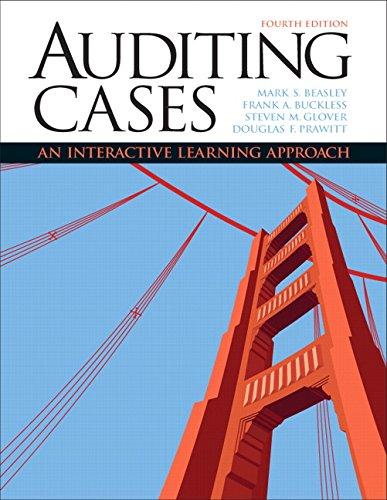Question
The following trial balance extracts (i.e. it is not a complete trial balance) relate to Adongo as at 30 June 2015: GHC000 GHC000 Revenue (note
The following trial balance extracts (i.e. it is not a complete trial balance) relate to Adongo as at 30 June 2015:
GHC000 GHC000
Revenue (note (i)) 113,500
Cost of sales 88,500
Research and development costs (note (ii)) 7,800
Distribution costs 3,600
Administrative expenses (note (iv)) 6,800
Loan note interest and dividends paid (notes (iv) and (vii)) 5,000
Investment income 300
Equity shares of GHC1 each (note (vii)) 30,000
5% loan note (note (iv)) 20,000
Retained earnings as at 1 July 2014 6,200
Revaluation surplus as at 1 July 2014 3,000
Other components of equity 9,300
Property at valuation 1 July 2014 (note (iii)) 28,500
Plant and equipment at cost (note (iii)) 27,100
Accumulated depreciation plant and equipment 1 July 2014 9,100
Financial asset equity investments at fair value 1 July 2014 (note (v)) 8,800
The following notes are relevant:
(i) Revenue includes a GHC3 million sale made on 1 January 2015 of maturing goods which are not biological assets. The carrying amount of these goods at the date of sale was GHC2 million. Adongo is still in possession of the goods (but they have not been included in the inventory count) and has an unexercised option to repurchase them at any time in the next three years. In three years time the goods are expected to be worth GHC5 million. The repurchase price will be the original selling price plus interest at 10% per annum from the date of sale to the date of repurchase.
(ii) Adongo commenced a research and development project on 1 January 2015. It spent GHC1 million per month on research until 31 March 2015, at which date the project passed into the development stage. From this date it spent GHC16 million per month until the year end (30 June 2015), at which date development was completed. However, it was not until 1 May 2015 that the directors of Adongo were confident that the new product would be a commercial success.
Expensed research and development costs should be charged to cost of sales.
(iii) Non-current assets:
Adongos property is carried at fair value which at 30 June 2015 was GHC29 million. The remaining life of the property at the beginning of the year (1 July 2014) was 15 years. Adongo does not make an annual transfer to retained earnings in respect of the revaluation surplus. Ignore deferred tax on the revaluation. Plant and equipment is depreciated at 15% per annum using the reducing balance method. No depreciation has yet been charged on any non-current asset for the year ended 30 June 2015. All depreciation is charged to cost of sales.
(iv) The 5% loan note was issued on 1 July 2014 at its nominal value of GHC20 million incurring direct issue costs of GHC500,000 which have been charged to administrative expenses. The loan note will be redeemed after three years at a premium which gives the loan note an effective finance cost of 8% per annum. Annual interest was paid on 30 June 2015.
(v) At 30 June 2015, the financial asset equity investments had a fair value of GHC96 million. There were no acquisitions or disposals of these investments during the year.
(vi) A provision for current tax for the year ended 30 June 2015 of GHC12 million is required, together with an increase to the deferred tax provision to be charged to profit or loss of GHC800,000.
(vii) Adongo paid a dividend of 20 cents per share on 30 March 2015, which was followed the day after by an issue of 10 million equity shares at their full market value of GHC170. The share premium on the issue was recorded in other components of equity.
Required:
(a) Prepare the statement of profit or loss and other comprehensive income for Adongo for the year ended 30 June 2015.
(b) Prepare the statement of changes in equity for Adongo for the year ended 30 June 2015.
Note: The statement of financial position and notes to the financial statements are NOT required.
Step by Step Solution
There are 3 Steps involved in it
Step: 1

Get Instant Access to Expert-Tailored Solutions
See step-by-step solutions with expert insights and AI powered tools for academic success
Step: 2

Step: 3

Ace Your Homework with AI
Get the answers you need in no time with our AI-driven, step-by-step assistance
Get Started


